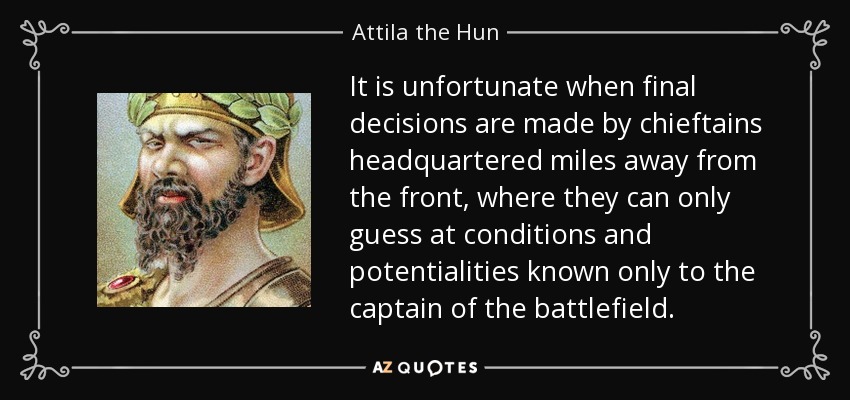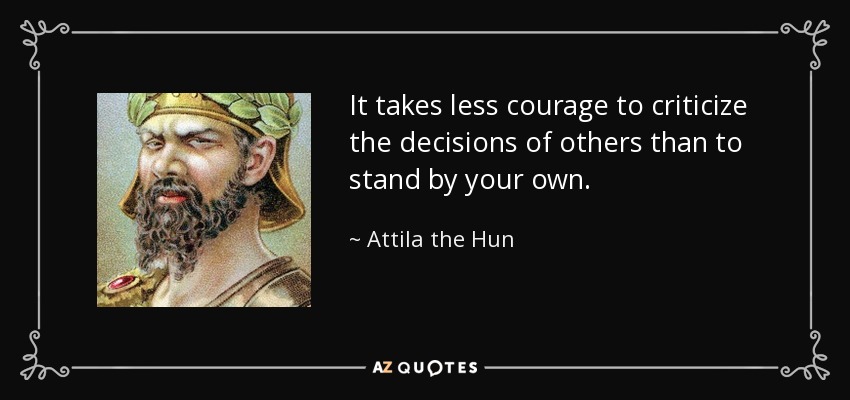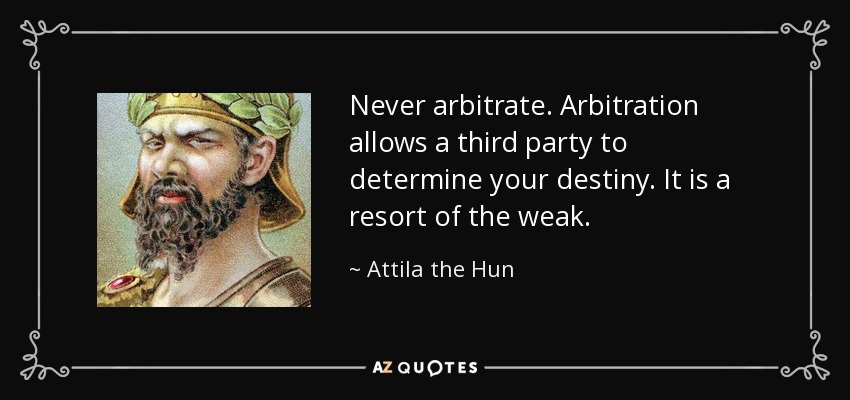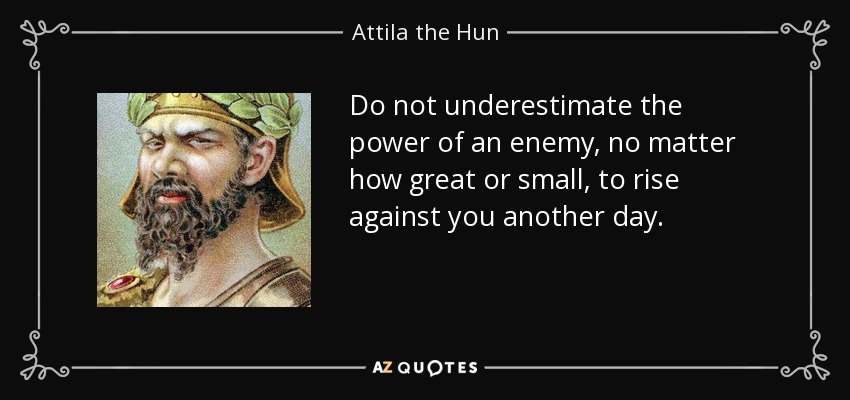Click here to return to Blog Post Intro

Dr. Roberts quickly notes, “Attila the Hun is a dubious character upon whom to base a metaphor on leadership. He’s been portrayed throughout history as a barbaric, ugly little tyrant whose hordes, in total disregard of accepted principles of conservation, ruthlessly destroyed the beautiful and tranquil countryside.”
In the spirit that you can learn leadership from anyone, let’s take a closer look.
Attila on “Leadership Qualities”
Attila would have noted that there is no quick way to develop leaders. Huns must learn throughout their lives—never ceasing as students, never being above gaining new insights or studying innovative procedures or methods—whatever the source. Here are some leadership qualities Attila valued:
- Loyalty: Disagreement is not necessarily disloyalty. A Hun who actively participates in or encourages actions that are counter to the good of the tribe is disloyal.
- Courage: Huns must be fearless and have the fortitude to carry out assignments given them.
- Desire: Huns must have an inherent commitment to influencing people, processes, and outcomes.
- Emotional Stamina: Leaders at every level have the stamina to recover rapidly from disappointment—to bounce back from discouragement, to carry out responsibilities of their office without becoming distorted in their views—without losing clear perspective.
- Physical Stamina: A healthy body supports a healthy mind. Chieftains must be strong in body in order to lead the charge.
- Empathy: Huns must show appreciation for and understanding of the values of others, a sensitivity for other cultures, beliefs, and traditions.
- Decisiveness: Huns must know when to act and when not to act, taking into account all facts bearing on the situation and then responsibly carry out their leadership role.
- Anticipation: Huns learn by observation and through instincts sharpened by tested experience, and cheiftains must anticipate thoughts, actions, and consequences.
- Timing: One gains this skill by applying lessons learned through failure.
- Competitiveness: Huns have an intrinsic desire to win. A leader without competitiveness is weak and easily overcome by the slightest challenge.
- Self-Confidence: Huns have a personal feeling of assurance with which to meet the inherent challenges of leadership.
- Accountability: Huns learn to account for personal actions and those of subordinates.
- Responsibility: Huns see that actions are carried out and directions followed.
- Credibility: Huns demonstrate the intelligence and integrity to provide correct information.
- Tenacity: Huns have an unyielding drive to accomplish assignments.
- Dependability: Huns who serve above and below them are counting on their ability to lead.
- Stewardship: Huns serve in a manner that encourages trust, confidence, and loyalty. Leaders are caretakers of the interests and well-being of those they serve.
Commitment to Leadership
Committed leaders, those with a lust for leadership, a willingness to serve, will be distinguishable by their wisdom, security, benevolence, authority, and courage. They will have a human quality and strong commitment to their cause and to that of those they serve.
You must have resilience to overcome personal misfortunes, discouragement, rejection, and disappointment. You must have the courage, creativity, and stamina to focus on accomplishing your responsibilities through the directed, delegated efforts of subordinates.
You must remember that success in your office will depend largely on your sustained willingness to work hard. Sweat rules over inspiration!
You must not be threatened by capable contemporaries or subordinates. Rather, you must be wise in selecting capable captains to achieve those things a chieftain can attain only through strong subordinates.
You must be willing to learn, to listen, and to grow in your awareness and abilities to perform the duties of your office. You must be willing to accept the simple fact that you have flaws and will need to work every day to become a better chieftain than you were yesterday.
Always accept the responsibility and privilege office seriously. Never should you exercise your authority to the disadvantage of your subordinates. Never should you exact more privilege from your office than your subordinates are willing to grant. You are your reputation!
Any promotion will require an adjustment on your part as well as on the part of those who remember you in your former role. Have patience with yourself and others.
Always pay proper courtesy to your subordinates. Should you fail to accord them respect, so will their subordinates.
Becoming a Hun
Every Hun must be willing to conform to those things that distinguish us as a nation of strong, unified tribes. We must be single in purpose, yet individuality that does not distract from the tribe or nation must be preserved. What is good for the Hun must be good for the tribe and nation.
Our accepted differences and diversities must be pooled into a common purpose worthy of our efforts as tribes and as a nation.
Our racial, cultural, moral and social concepts, inherited from our ancestors of Asia and Europe, must be recognized and honored by all.
Peace in the Camp based on Morale and Discipline
Morale and discipline are central to unity.
Discipline is not suppression. It is teaching of correct ways expected of Huns. Morale is the spirit by which Huns submit their services to the tribe. It is not uncontrolled celebration and romping around a campfire.
Discipline builds inner confidence of our Huns. Thus, discipline builds morale. Lack of morale and discipline is the most contagious and destructive disease that can ever enter your camp.
The Fury of Internal Battles
Beware of the treacherous Hun who pledges loyalty in public then spreads discontent in private. Make every effort to identify and remove these ignoble characters, be they chieftains or your best warriors.
Never expect your Huns to always be compatible. But expect their differences to be resolvable without the spread of discontent to other Huns.
Be approachable; listen to both good and bad news from your Huns. Otherwise, you will provide reason for murmurings.
Reward Huns of character and integrity—they are rare. The spirit of unity must be a cardinal principle in the ways and attitudes of all Huns. Once divided, we are easily made subject to foreign nations.
The unification of our tribes into a strong and formidable nation can only be realized through loyalty to our cause and to those who reign with responsibility over the destiny of our mighty horde.
Pick Your Enemies Wisely
Do not expect everyone to agree with you—even if you are king. Do not waste stamina trying to negotiate with implacable, uncooperative enemies.
Do not consider all opponents to be enemies. You may have productive, friendly confrontations, with others inside and outside your tribe.
Do not try to conform everyone’s behavior.
Do not delegate an assignment and then attempt to manage it yourself—you will make an enemy of the subordinate.
Leading the Charge: Responsibilities of a Chieftain
The Huns adapted a new spirit of unity during the reign of Attila. Attila, with his magnetic force, influence and, perhaps, charm, through which he united the Huns was so awe-inspiring to his warriors and chieftains that he as worshipped by them—even as a god by some.
Chieftains and leaders in every subordinate office were responsible for establishing the atmosphere in which they lead. By their own actions, not their words, leaders establish the morale, integrity and sense of justice of their subordinate commanders. They cannot say one thing and do another.
Leaders must expect continual improvement in their subordinates based on new knowledge and experiences. Leaders must encourage creativity, freedom of action and innovation among their subordinates.
Chieftains must teach their Huns well that which is expected of them.
Success is the result of hard work that overcomes all forms of disappointment and moments of discouragement. Success is not achieved through complex strategies.
The Essentials of Decisiveness
As their leaders, we teach followers to take the initiative, have the moral courage and force that make the difference between followers and leaders.
Noble resolve to do the right thing is characteristic of prudent decision making.
Next to the importance of knowing when to make a decision stands the insight to know when to forgo making one. Impatient chieftains often precipitate premature action. Wise is the chieftain who never makes a decision when he doesn’t understand the issue.
A chieftain should allow his subordinates the privilege of making decisions appropriate to their level of responsibility. Weak is the chieftain who reserves every decision for himself out of fear that he might lose control.
Perhaps the most critical element of decision making is timing. Prompt determination after appropriate deliberation is a worthy principle of decisiveness.
Chieftains must avoid decisions that favor themselves at the expense of the Huns.
In the end, vision, drive, energy, singleness of purpose, wise use of resources and a commitment to a destiny worthy of his efforts become a character of a chieftain who excels.
The Art of Delegation
Chieftains should never delegate responsibilities necessitating their direct attention. Those actions that don’t require a chieftain’s direct handling are appropriately delegated to the one most to fulfill the assignment.
Wise chieftains grant both authority and responsibility to those they have delegated assignments and always hold their subordinates accountable.
Once a chieftain has delegated responsibilities, he should never interfere. Such superficial delegation yields fury in the hearts of subordinates.
Realize that a chieftain cannot accomplish every responsibility of his office by himself. Should he prove otherwise, a leader should understand that he is, in fact, chieftain over little or nothing at all.
Subordinates will never develop their skills if their chieftain precisely directs them how to accomplish delegated assignments.
A wise chieftain expands his influence and ability to serve the nation only through the art of delegation.
Rewarding Your Huns
Booty, the spoils of victory, was for many tribes the mainstay of their existence.
Never reward a Hun for doing less than is expected of him or for every act completed correctly. Grant small rewards for light tasks.
Teach your Huns that the booty of battle is nothing more than wages for their service.
Care more for the rewarding of your Huns than for rewarding yourself.
Be generous with small tokens of appreciation—they multiply in returned loyalty and service.
The Art of Negotiation
Always negotiate at the lowest level possible. This will serve to resolve small things before they grow out of proportion and make negotiating impossible. Never trust negotiation to luck. Enter every session armed with knowledge of the enemy’s strengths and weaknesses. In negotiation, you must take well-studied risks.
Present appealing alternatives that are appropriate to your opponent’s situation at the moment of your negotiations. Honor all commitments you make during negotiations lest your enemy fail to trust your word in future.
It is never wise to gain by battle what may be gained through bloodless negotiations. Reserve the potential loss of your warriors for great causes not attainable without waging battle.
Surviving Defeat
We must not be unprepared for new tactics employed by the enemy, but no chieftain will ever win every encounter—sometimes you will lose, regardless of how prepared you are to win.
Retreat is noble when continuance with the battle or the issue at hand would result in further losses or total annihilation of your resources.
Learn from defeat!
If you fail to sharpen your leadership prowess after confronting unconquered obstacles, your experiences were for naught, and you, as well as your subordinates, will become nothing more than a helpless victim.
It is a simple truth that the greater your accomplishments—your victories—the greater opposition, torment and discouragement your enemies will throw in your path. Expect it!
Our vision of the future must build on the strength past. Yet, we must anticipate new challenges and opportunities. We must never fail to analyze the past.
Departing with Nobility
It is the wise chieftain who prepares himself for the eventual moment when his time has passed and a new chieftain is about to take charge. This preparation should be made over time, to avoid precipitating insecurity or loss of commitment or dissipating confidence.
It is noble tor the departing chieftain to express gratitude to all who have served him well.
It is noble for Huns to honor their departing chieftain, giving recognition and appreciation for his service to them. It is noble for the departing chieftain to voice his confidence that the new chieftain will serve his Huns well, perhaps even improving their conditions.
It is noble for the departing chieftain to leave his command forever, never attempting to return by influencing the Huns once in his command.





